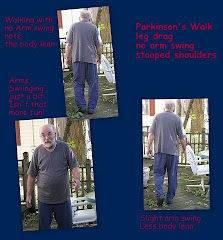ProSavin - Will it break our hearts or Parkinsons?
I've had PD long enough to get caught up in the hoopla for several treatments that were susposed to be The Cure. Then something or other always happened to break our hearts. Either it just didn't work, or the company ran out of money, or it worked and the company went crazy -you know which one I'm talking about.
So here's another one that may or may not be the one but it sure sounds good so far. I've read about the potential for this gene delivery vector but just hadn't gotten around to writing about ProSavin. So thanks for the nudge, Ken, it's time to talk about ProSavin.
ProSavin is a novel gene therapy for Parkinson's disease. It was developed by Oxford Bio Medica in the UK. It is currently in Phase I/II trials in France. Phase III has been targeted to begin during 2009.
ProSavin makes use of Oxford Bio Medica's LentiVector(R), a benign virus modified to transduct specific genetic material into a cell. ProSavin is carrying three enzymes needed for dopamine synthesis: tyrosine hydroxylase, GTP-cyclohydrolase 1 and aromatic amino acid dopa decarboxylase. It is being tested with humans, for safety and efficacy with low dose and high dose trials.
Previously pre-clinical testing has show an almost complete recovery of movement function as well as metabolic and behavioral functions. The treatment has lasted for over 27 months without diminishing.
ProSavin was determined to be safe during the preclinical testing and caused no side effects even at doses hundreds of times higher than will be tested on patients.
Parkinson's is caused by the death of dopamime neurons (followed by the lowered production of norepinephrine neurons and serotonin depletion) leading to movement impairments and other symptoms. ProSavin restores dopamine production in the brain. Unlike other surgical procedures for PD which necessitate destruction of some brain tissue, ProSavin is administered locally to the striatum converting the nerve cells there into a replacement dopamine factory within the brain thus replacing the patient's own deteriorating source of neurotransmitters.
Patients in the trial must be failing on L-DOPA treatments, but will not have progressed to drug-induced dyskinesias. They are usually in the middle to late stages of PD.
The surgical procedure for administration of ProSavin is stereotactic bilateral injection into the striatum under general anesthesia, using MRI imaging and mapping.
The principal investagator is Stephane Palfi, MD, PhD, a neuroscientist and neurosurgeon at Henri Mondor Hospital and the Centre National de la Recherche Scientifique in Paris, who remarked, " Current standard theraphy for Parkinson's is only partially effective in the mid to late stages of the disease and can induce debiltating side-effects after long term use. ProSavin has the potential to address this unmet medical need, offering a long-lasting benefit from a single administration."
Those of us who currently meet the testing standards are hoping that Phase III will be initiated soon. It is good to have hope.
Sources: Parkinson's Disease Society, Dec 2, 2008
Oxford Biomedica: Press Release
11/04/2008. Novel New Gene Theraphy
Additional Information:
Dr Stephane Palfi
Hôpitaux de Paris, Groupe Henri-Mondor Albert-Chenevier, Service de Neurochirurgie
Créteil, F-94010, France
Saturday, January 24, 2009
Subscribe to:
Post Comments (Atom)














No comments:
Post a Comment
Welcome to Parkinsons Focus Today.
We are delighted to hear from you by comment here
or through email as found in Contact Us.
Please do not include email addresses if leaving a comment online.
Email addresses are used only for email responses.
Spammers take note: your messages will not be published. The comments section is for an exchange of ideas, not for backlinks.